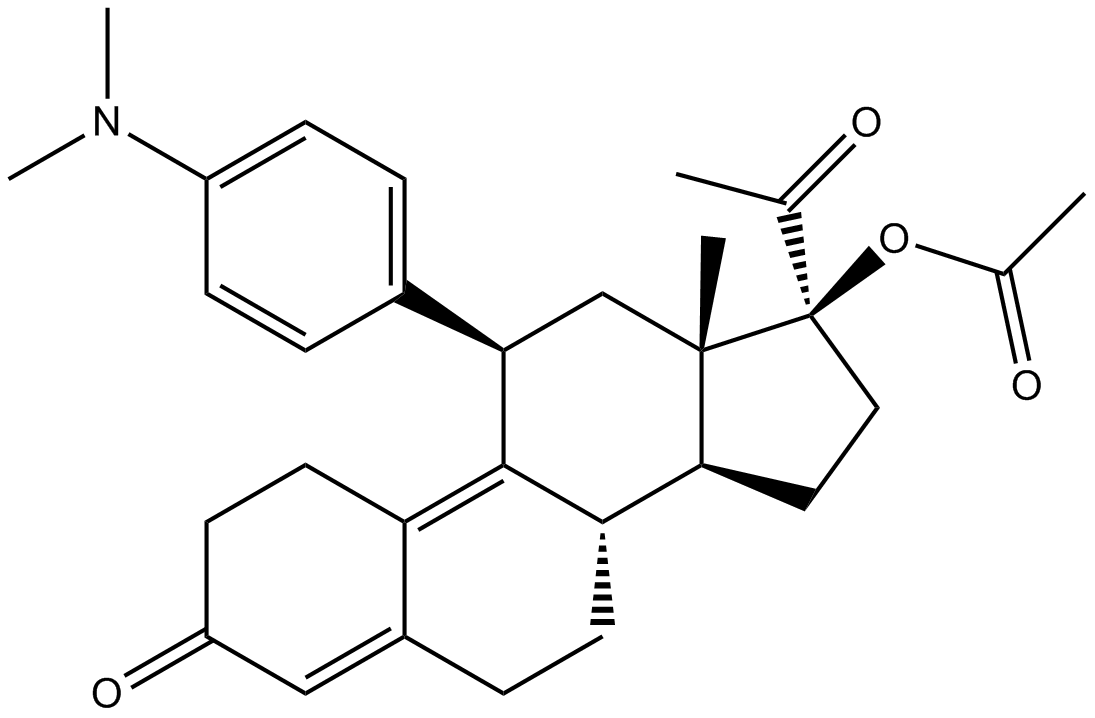Ulipristal acetate (Synonyms: CDB 2914, HRP 2000, RU 44675) |
| رقم الكتالوجGC11677 |
Ulipristal acetate (CDB-2914) عبارة عن مُعدِّل مستقبلات البروجسترون الانتقائي النشط عن طريق الفم (SPRM)
Products are for research use only. Not for human use. We do not sell to patients.

Cas No.: 126784-99-4
Sample solution is provided at 25 µL, 10mM.
Ulipristal (acetate) is a novel selective progesterone receptor modulator (SPRM) for the treatment of benign gynecological conditions such as uterine myoma.
Ulipristal acetate blocks activin A modulation of fibronectin and vascular endothelial growth factor A (VEGF-A) mRNA expression in cultured myometrial and leiomyoma cells[2]. Ulipristal acetate decreases the DNA fragmentation at the 100-ng/mL dose and continuing up to the 10,000-ng/mL dose compared to those spermatozoa in the control group[3].
Ulipristal and CDB-4124 have significant antiprogestational activity in vivo[1]. Ulipristal acetate decreases incidences of fibroadenomas and adenocarcinomas in the mammary gland in all treated groups. Ulipristal acetate exposure [AUC(0-24h)] at the highest dose in rats is 67 times human therapeutic exposure at 10 mg/day. In mice, no tumor of any type increases at Ulipristal acetate exposures up to 313 times of therapeutic exposure. Ulipristal acetate-related findings in mice are limited to organ weight changes in the liver, pituitary, thyroid/parathyroid glands, and epididymis as well as minimal panlobular hepatocellular hypertrophy in male and female mice receiving 130 mg/kg/day[4]. Ulipristal acetate (1 mg/kg and 5 mg/kg) increases the frequency with which pathologists assessed the endometrium as being thickened compared to controls in a dose-dependent manner. There is a slight decrease in secretory differentiation with increasing dose of Ulipristal acetate, with small decreases in frequency of sub- and supra-nuclear vacuolation[5].
References:
[1]. Attardi BJ, et al. In vitro antiprogestational/antiglucocorticoid activity and progestin and glucocorticoid receptor binding of the putative metabolites and synthetic derivatives of CDB-2914, CDB-4124, and mifepristone. J Steroid Biochem Mol Biol. 2004 Ma
[2]. Ciarmela P, et al. Ulipristal acetate modulates the expression and functions of activin a in leiomyoma cells. Reprod Sci. 2014 Sep;21(9):1120-5.
[3]. Munuce MJ, et al. Effects of ulipristal acetate on sperm DNA fragmentation during in vitro incubation. Eur J Contracept Reprod Health Care. 2013 Oct;18(5):355-63.
[4]. Pohl O, et al. Carcinogenicity and chronic rodent toxicity of the selective progesterone receptor modulator ulipristal acetate. Curr Drug Saf. 2013 Apr;8(2):77-97.
[5]. Pohl O, et al. A 39-week oral toxicity study of ulipristal acetate in cynomolgus monkeys. Regul Toxicol Pharmacol. 2013 Jun;66(1):6-12.
Average Rating: 5 (Based on Reviews and 25 reference(s) in Google Scholar.)
GLPBIO products are for RESEARCH USE ONLY. Please make sure your review or question is research based.
Required fields are marked with *




















